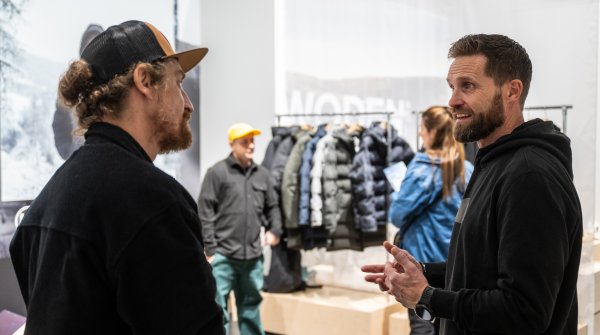
Patagonia has been a sustainability pioneer since the company was founded in 1973 by Yvon Chouinard. What began in 1985 with the donation of one percent of revenues to environmental groups reached a temporary climax in September 2022, when Chouinard announced that he would cede his company shares worth around three billion euros to a charitable foundation. All income that is not reinvested is to go to the foundation's environmental projects in the future. According to the founder, this had recently been around 150 million euros per year.

The outdoor professionals at Houdini have done it: they have closed the loop! Since 2022, 100 percent of the fabrics in the new Houdini collections are recycled, recyclable, renewable, biodegradable or Bluesign-certified. CEO Eva Karlsson gave an exclusive insight into her company's course in the ISPO.com series Challenges of a CEO. Her advice to the business community: take a whole new perspective on your role. "Today, the definition of value creation seems to be very narrow and limited only to financial values: however, this is no longer meaningful and relevant enough and does not appeal to our customers, employees or anyone else," says Karlsson.

Microfibers and microplastics in wastewater are a serious environmental problem. According to "Greenpeace", up to 30 percent of the microplastic in the oceans does not come from decomposed plastic waste, but already enters the water as microplastic via sewage sludge - quite a few of them through polyester textiles or other synthetic fibers. The European Outdoor Group, together with numerous sports labels such as Adidas, Arc'Teryx, Decathlon and Puma, supports the Microfibre 2030 Commitment. The goals of the Commitment:
- To develop a test method for measuring fiber waste in wastewater during production.
- To determine a threshold value for microfiber waste in production facilities.
- To build a data infrastructure for accurate recording and control of microfiber waste in production facilities.

With its labels Ortovox, Deuter, Maier Sports and Gonso, Schwan Stabilo Outdoor has been involved in the Fair Wear Foundation since 2011. With NFC tags on the sports articles that contain information about the materials used, Maier Sports makes it easier for recycling plants to process the products for recycling as efficiently as possible. But as Martin Riebel, CEO of Schwan-Stabilo Outdoor, makes clear at Challenges of a CEO, recycling is "still a partial solution." He calls for a "joint show of strength" from the outdoor industry to address the issue of the circular economy holistically in an integrated model.
Scandinavia's outdoor industry is known as a pioneer when it comes to sustainability. The latest example from May 2022: The Scandinavian Outdoor Group and its 70 member brands have unanimously declared their support for compliance with the climate protection targets of the Intergovernmental Panel on Climate Change (IPCC). Anyone who wants to be or become a member of the Scandinavian Outdoor Group must therefore commit to the emissions targets of the UN climate protection program. Thus, the 70 members of the SOG, including outdoor heavyweights such as Dometic, Thule, Fjällräven, CAKE and many more, are committed to the "Race to Zero" campaign for CO2-neutral business.
Not only sporting goods manufacturers, but also retailers can make their contribution to more environmental protection. After all, what good is the most sustainable outdoor product if customers don't know about it? The outdoor specialty retailer Globetrotter has therefore introduced its product seal "A Greener Choice" - both online and offline. The repair workshops, rental offers and sales areas for used products now set up in almost all Globetrotter stores are initiatives save valuable resources and give sporting goods a longer life cycle. Globetrotter has been nominated for the German Sustainability Award, among others, for its commitment to sustainability.
In order for a brand to reduce its ecological footprint, it needs know-how. And that is exactly what the non-profit foundation myclimate offers with consulting, education and the supervision of carbon offset projects. In May 2022, myclimate presented its annual report for 2021. According to the report, myclimate had contributed to more than 3.7 million tons of CO2 being voluntarily offset in the past year alone. According to its own information, myclimate has meanwhile planted more than 18.1 million trees and helped to treat more than 3.7 billion liters of drinking water, among other things.
 Sustainability4 tips to Green Deal-compliant packaging
Sustainability4 tips to Green Deal-compliant packaging
- Awards
- Mountain sports
- Bike
- Fitness
- Health
- ISPO Munich
- Running
- Brands
- Sustainability
- Olympia
- OutDoor
- Promotion
- Sports Business
- Textrends
- Triathlon
- Water sports
- Winter sports
- eSports
- SportsTech
- OutDoor by ISPO
- Heroes
- Transformation
- Sport Fashion
- Urban Culture
- Challenges of a CEO
- Trade fairs
- Sports
- Find the Balance
- Product reviews
- Newsletter Exclusive Area
- Magazine



